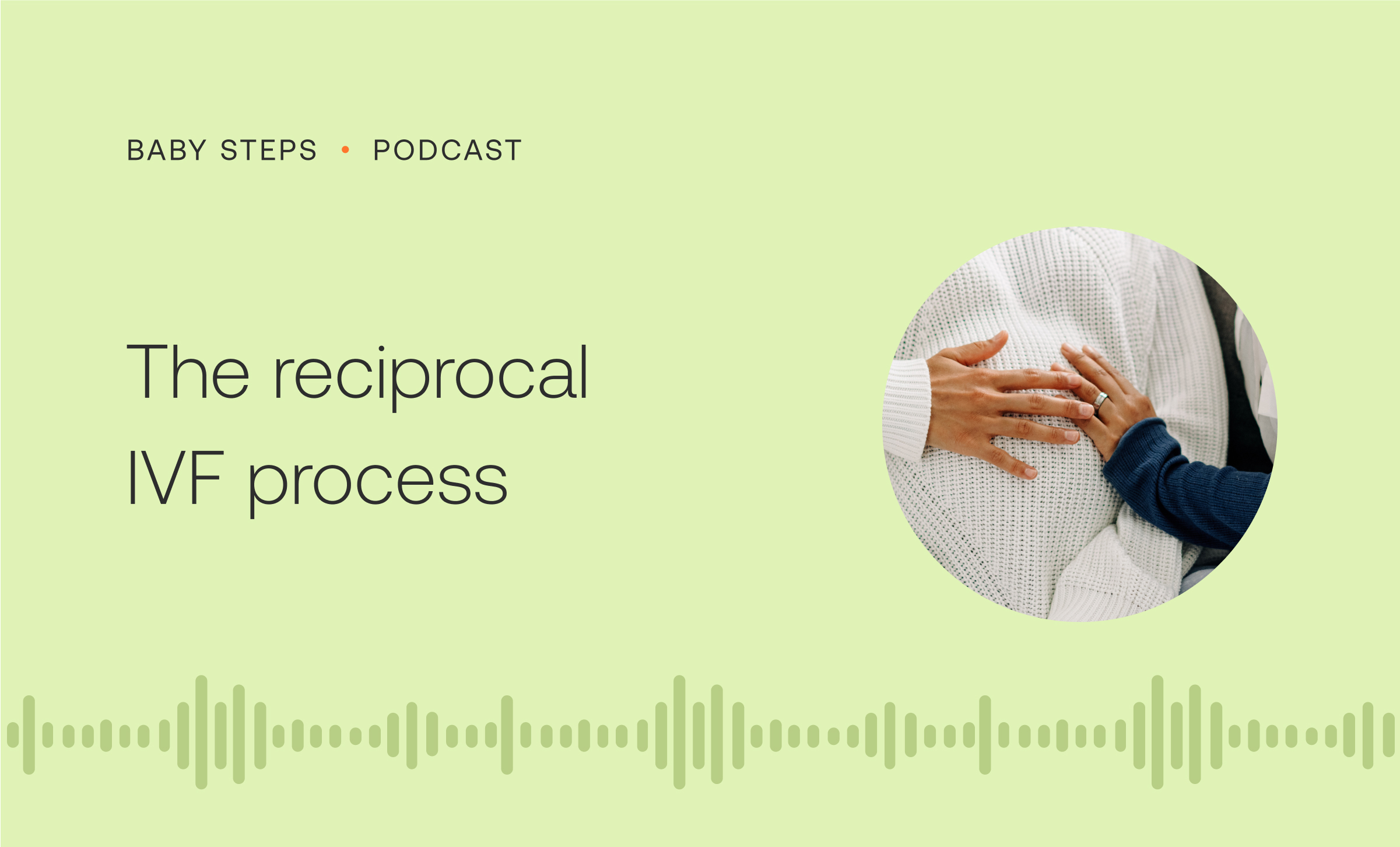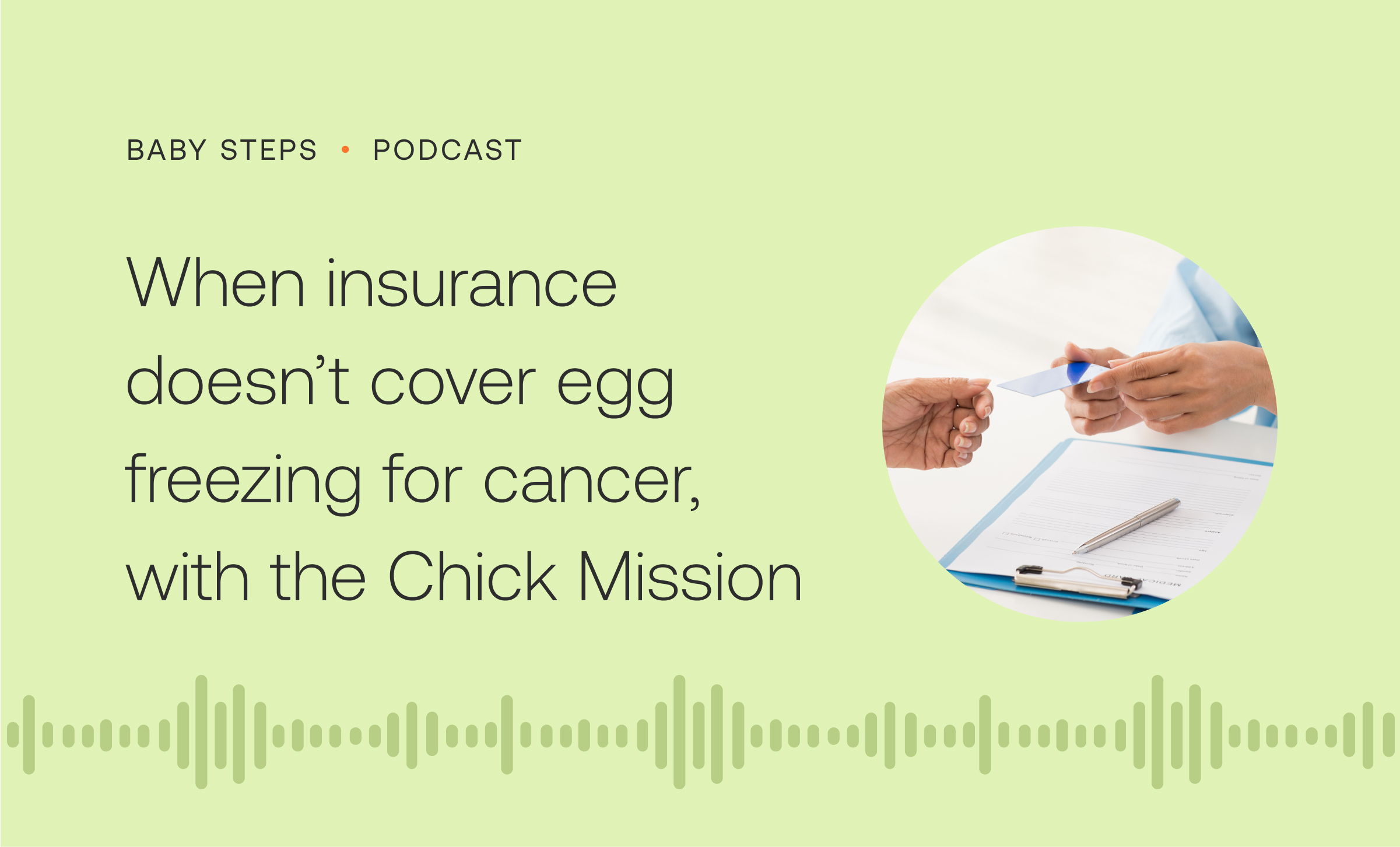In 2012, egg freezing was declared no longer experimental in the United States, and demand for the procedure has been rising ever since. The Society for Assisted Reproductive Technology recorded just 7,591 egg freezing procedures in 2015, and by 2022 that number had climbed to 29,083, almost a 300 percent increase.
More and more companies are also offering egg freezing as part of their benefits packages. In 2015, only 5% of employers covered this type of fertility preservation. Fast forward to today – 20% of employers provided egg freezing coverage to their employees in 2024.
The increased availability of fertility preservation empowers people to make choices about when and how to have children on their own terms. Egg freezing offers the flexibility to delay starting a family without the pressure of the “biological clock,” and allows for more autonomy over reproductive decisions that can have a big impact on other areas of life.
What is egg freezing?
Egg freezing is a procedure used to collect, freeze, and store a person’s eggs (or oocytes) to prepare for pregnancy at a later date. Also known as oocyte cryopreservation, egg freezing can be a valuable way to preserve fertility over time.
As people age, the number and quality of eggs likely to result in a healthy pregnancy decrease, so the goal of egg freezing is to increase the chances for a successful in-vitro fertilization (IVF) cycle in the future.
Why freeze your eggs?
There are many valid medical and elective reasons to consider freezing your eggs.
The egg freezing process was initially developed for people undergoing cancer treatment, since chemotherapy, radiation, and surgery can put fertility at risk. Surgical interventions for conditions such as endometriosis, ovarian tumors, and ovarian cysts can also impact fertility. For trans or non-binary people, egg freezing can help preserve fertility before starting hormone therapy or other gender-affirming care. Your doctor may recommend egg freezing if you’re undergoing any of these medical procedures.
Due to the rising availability and awareness of egg freezing, there are now a wide range of non-medical reasons people elect to freeze their eggs. Some common ones include:
- Focus on other priorities. Many people choose to delay childbearing so they can have more flexibility to focus on things like career advancement, education, travel, financial stability, or other personal goals.
- No current partner. Some may choose to preserve their fertility until they find the right person to raise a child with, or until single parenthood becomes a feasible option for them.
- Family building uncertainty. For people who are unsure what their future family-building journey will look like, such as LGBTQ+ folks or those with concerns about fertility challenges, egg freezing can keep options open and provide valuable peace of mind.
Candidates for egg freezing
Egg freezing is a personal decision that depends on a variety of factors. Only you and your fertility care provider can determine whether or not you’re a good candidate for egg freezing.
Best age to freeze eggs
According to the American Society for Reproductive Medicine, the best chance of a successful pregnancy comes from eggs that are frozen before the age of 38.
As people age, their eggs are more likely to have alterations or mutations in their DNA. These abnormalities make it harder to get pregnant and increase the risk of miscarriage or having a child with a genetic disorder. However, it’s important to note that everyone is different, and it’s impossible to predict exactly how long someone will remain fertile.
The best information about your own fertility over time will come from ongoing discussions with your reproductive endocrinologist.
Health factors that can impact success rates
The success of an egg freezing procedure and the potential for future pregnancy from those eggs can be influenced by multiple things:
- Age. Both the age of the person when the eggs are frozen, and the age of the person undergoing an IVF cycle with the frozen eggs impact success rates.
- Number of eggs. The ovarian reserve, or the number of eggs stored in the ovaries, directly affects the number of eggs able to be harvested and stored during an egg freezing procedure. The number of healthy frozen eggs available for implantation also affects the success rate of IVF.
- Chronic conditions. Conditions such as polycystic ovary syndrome (PCOS), thyroid disorders, diabetes, autoimmune diseases, or other chronic illnesses can affect hormonal regulation and fertility.
- Lifestyle factors. Smoking, excessive alcohol consumption, or a sedentary lifestyle can negatively impact egg quality and ovarian function.
- Genetic factors. Inherited conditions, such as early menopause or certain genetic disorders, can be important considerations for those freezing eggs.
Medical history and fertility assessments needed before freezing
When preparing for an egg freezing procedure, there are a number of assessments your fertility specialist may conduct to evaluate your reproductive health.
The first thing they’ll need is an understanding of your medical history. This includes reviewing your menstrual history, any previous pregnancies or miscarriages, family history of fertility issues, and existing medical conditions. They will also take into consideration any medications, treatments, or surgeries you’ve had.
One of the key goals of the testing done in preparation for egg freezing is to look at the health of your ovarian reserve. Depending on your care provider, they may perform one or more of the following tests to help determine the quantity of eggs available for removal:
- AMH (Anti-Müllerian Hormone) blood test. AMH is a hormone secreted by the ovarian follicles, and a key marker for ovarian health. This test measures AMH levels, which can indicate the quantity of eggs remaining in the ovaries.
- FSH (Follicle Stimulating Hormone) blood test. FSH is a hormone produced by the pituitary gland to control follicle development and egg production. This test is typically done on day 3 of your cycle to evaluate ovarian function.
- Antral Follicle Count (AFC) ultrasound. This test is performed during early menstruation to assess the number of small follicles in the ovaries, which can help estimate ovarian reserve.
In addition to assessing egg quantity, there are other screening tests that may be used. A transvaginal ultrasound can be helpful to check for ovarian cysts, fibroids, or other structural abnormalities in the reproductive system. Additional blood tests for other hormones such as estradiol or luteinizing hormone (LH) can provide further insight into overall reproductive health. And finally, in some cases, genetic testing may be recommended to check for inherited conditions that could impact fertility.
The egg freezing process: Step-by-step
Harvesting enough eggs to freeze requires multiple visits to the clinic, days of hormone injections, mild discomfort, and possibly some emotional strain. The process as a whole takes a few weeks, but results in eggs that can be cryopreserved for years.
Step 1: Initial consultation and fertility evaluation
One hour plus preparation time
The first step is to meet with your fertility care provider and come up with an egg freezing plan based on your unique fertility situation. The evaluation of your fertility and ovarian reserve will likely include a review of your medical history, some hormonal blood tests, and ultrasound examination. The amount of preparation time between your consultation and the next step will depend on where you are in your menstrual cycle and, if applicable, the influence of your hormonal birth control.
Step 2: Hormone injections to stimulate ovaries
10-14 days of injections with monitoring appointments every 1-3 days
The next step in freezing your eggs involves daily self-administered hormone shots, part of a process known as “controlled ovarian hyperstimulation.” In a normal ovulation cycle, only one egg matures, but the combination of medications used for these injections causes the ovaries to develop multiple eggs at one time. This part of the egg freezing cycle also includes regular monitoring appointments with blood tests and ultrasound exams to keep a close eye on hormone levels and ovarian response.
Step 3: Egg retrieval process
20-30 minute procedure 36 hours after final hormone shot, plus 24 hours of recovery
The final hormone injection, also known as the “trigger shot,” is administered 36 hours before the eggs are harvested. The minor surgical procedure used for egg retrieval typically takes only 20 to 30 minutes, and is performed under light sedation or anesthesia depending on the clinic.
It involves using a transvaginal ultrasound to guide a thin needle into one or more follicles in order to remove mature eggs from the ovaries. The number of eggs able to be collected depends on a wide range of factors, from your age and ovarian reserve, to your response to the hormone injections and more.
Although the procedure itself is brief, be sure to plan for some recovery time afterwards. Many people experience mild cramps, bloating, or discomfort, and you’ll need 24 hours for your body to fully rest and recover from whichever anesthetic your clinic uses. It’s recommended to avoid heavy exercise or high impact activities during that time period.
Step 4: Freezing and storage
For as long as you decide
Once your eggs are retrieved, they are carefully frozen and stored in a cryogenic facility. Eggs can be stored indefinitely, there is no time limit. When you're ready to use your eggs, they will be thawed for use in a typical IVF cycle and fertilized with sperm in a lab to create an embryo. The best-quality embryo will then be transferred to a uterus — this is also known as embryo transfer. The uterus could be yours or the person intending to carry the pregnancy, such as your partner or a gestational carrier.
How much does egg freezing cost?
The cost of egg freezing can vary widely depending on your location, clinic, and individual needs, but on average, the entire process can range from $15,000 to $20,000 per cycle. This cost typically covers:
- Initial consultation and fertility evaluation
- Medications for ovarian stimulation and related needs
- Regular monitoring appointments with blood tests and ultrasounds
- The egg retrieval procedure itself, including anesthesia
- Egg freezing and cryopreservation storage fees
Many people choose to go through more than one egg freezing cycle to increase the quantity of eggs preserved and improve the chances for a potential future pregnancy. This becomes a substantial out-of-pocket investment, especially when you take into account the IVF costs that’ll be required when you’re ready to use your frozen eggs.
You’ll definitely want to check your insurance coverage before starting the process to see what financial support is available. If your employer offers inclusive and comprehensive fertility benefits through Carrot, you’ll be able to offset egg freezing costs with employer-sponsored funds, and speak with fertility experts and care navigators who can support you throughout the process.
Learn how to ask your employer for fertility benefits.
Egg freezing success rates
There are several hurdles a frozen egg has to overcome to result in a healthy pregnancy. First, the eggs must be successfully thawed. Then, one has to be fertilized with sperm in a lab and develop into a viable embryo. That embryo then has to implant in the uterus and continue healthy development to lead to a pregnancy.
In a 2023 study from the Guy’s and St Thomas’ Hospital NHS Foundation Trust, researchers found the following success rates for egg freezing:
- 79% of frozen oocytes survived the thawing process
- 68% of the thawed eggs were successfully fertilized and available for transfer
- 35% of the embryos transferred to a uterus resulted in a live birth
Success rates by age
There are two different ways to evaluate the success rates of egg freezing by age, either by looking at the quantity of eggs able to be collected during the procedure or by looking at the chances of a live birth based on the age the eggs were frozen.
On average, the younger you are, the more likely it is to retrieve a higher quantity of eggs in a single egg freezing cycle. As you age, the chances increase that you’ll need to go through multiple cycles of egg freezing to ensure you have enough mature oocytes banked to maintain similar odds of pregnancy via IVF.
A 2019 study of 1,241 participants found the following averages for the number of eggs successfully collected for freezing in a single cycle:
In a study of 1,171 IVF cycles using frozen oocytes, researchers found the following success rates based on the age of egg cryopreservation:
Pregnancy rate without PGT-A
Other factors that can impact the success of using frozen eggs
Aside from age, there are several other factors that can impact the success of using frozen eggs, including:
- The state of your ovarian reserve, or the number and quality of eggs available
- Your body’s response to ovarian hyperstimulation during the egg retrieval process
- Reproductive health conditions like endometriosis, PCOS, or fibroids
- Important aspects of your medical history such as surgeries or genetic conditions
- Lifestyle choices including smoking, alcohol consumption, activity levels, or nutrition
- The techniques used for egg freezing and thawing
- The expertise of your fertility clinic and/or cryopreservation facility
How to improve your chances of success
Here are some of the key actions you can take to improve your chances of egg freezing success:
- Consider freezing your eggs earlier
The sooner you freeze your eggs, the better. Preserving them at a younger age can significantly increase your chances of success, as egg quality and quantity naturally decline with age. - Prioritize your fertility health first
Focus on optimizing your overall health — maintaining a balanced lifestyle, managing any health conditions, and ensuring your hormones are in harmony — before moving forward with egg freezing. - Consider multiple egg retrieval cycles
If possible, undergoing more than one egg retrieval cycle can help you collect a greater number of eggs, improving your chances for future IVF success. - Choose your clinic with care
Take the time to select a clinic with a strong track record in egg freezing, advanced technology, and positive patient outcomes. The right clinic makes all the difference.
Risks and side effects
The most common side effects of the egg freezing process are typically a result of the hormone injections. They are not usually severe, and are normal reactions to the changes in hormone levels, such as:
- Hot flashes
- Headaches
- Irritability
- Restlessness
- Fatigue
- Nausea
- Mood swings
- Breast tenderness
- Abdominal discomfort
A more serious risk of the medications used to stimulate the ovaries is Ovarian Hyperstimulation Syndrome (OHSS). OHSS occurs when the ovaries over produce eggs, and become swollen and painful. Severe OHSS is rare, and only occurs in 0.1 to 2% of egg retrieval cycles. The monitoring appointments you will attend throughout the egg freezing process will help your care provider adjust your medications as needed to prevent OHSS from occurring.
During the cryogenic processes, there is a small risk of physical damage to the eggs during freezing and thawing, but this is naturally mitigated by the number of eggs collected. As for the risk of storing frozen eggs, fortunately the Society for Assisted Reproductive Technology has found there is no significant difference between the live birth success rates for frozen versus fresh eggs in an IVF cycle.
FAQs about egg freezing
Can I freeze my eggs if I have PCOS?
Yes, egg freezing can be a great option for people with PCOS who are worried about fertility challenges in the future. In fact, research shows there is no significant difference in the number and quality of eggs retrieved from people with PCOS compared to people without it.
However, note that PCOS does increase your chances for OHSS during the hormone injection process, so be sure to discuss this with your fertility care provider.
Can I freeze my eggs with an IUD?
Yes, you can successfully collect and freeze eggs for cryopreservation with an IUD. Copper IUDs have no impact on the reproductive processes required for ovarian stimulation, and the small amount of hormones typically released by other types of IUDs has no significant impact on the success of egg retrieval.
How long can eggs be stored?
Your eggs can be stored indefinitely depending on where you live. For example, in the UK you can store your eggs for up to 55 years.
There is currently a limited body of research on the long-term effects of egg storage since egg freezing has only recently become more widespread. However, according to Dr. Hosseinzadeh, a reproductive endocrinologist at the Johns Hopkins Fertility Center, “We’ve been freezing embryos for a long time. We’ve had pregnancies from embryos that were frozen for more than 10 years. We assume that eggs would behave similarly if frozen.”
How many times will I have to go through the process?
On average, people go through 2.1 egg freezing cycles. The older you are, the more likely it is you’ll need multiple rounds of egg retrieval to freeze enough eggs so you can improve your chances of a future pregnancy via IVF.















